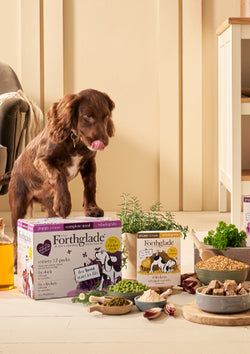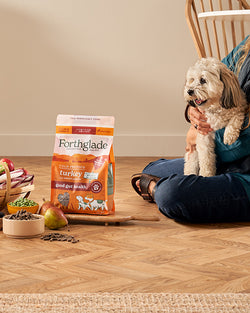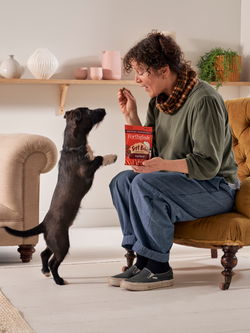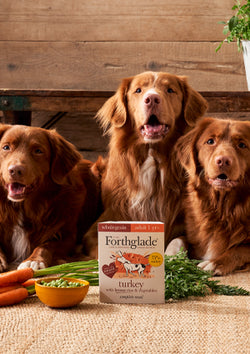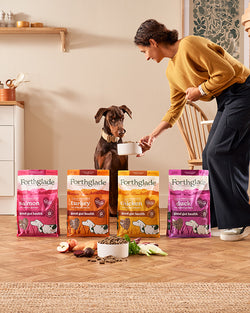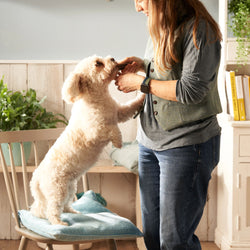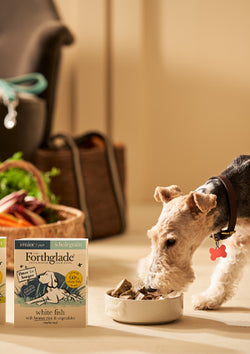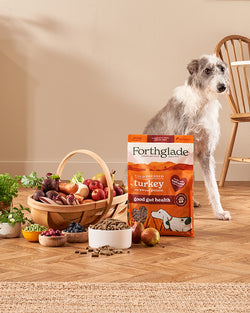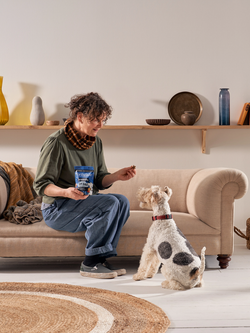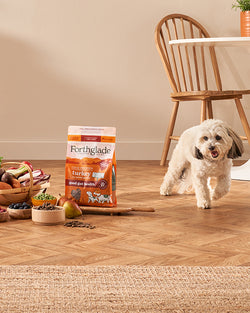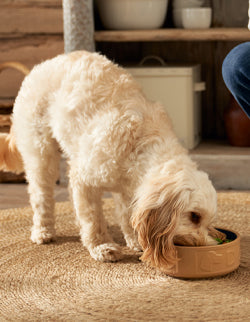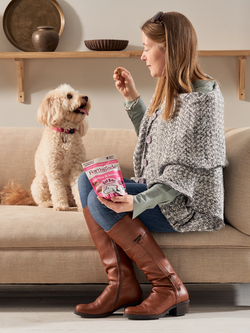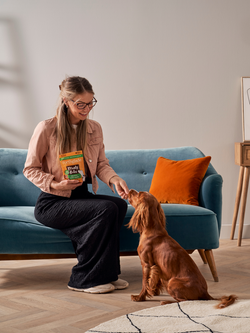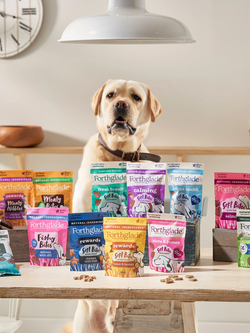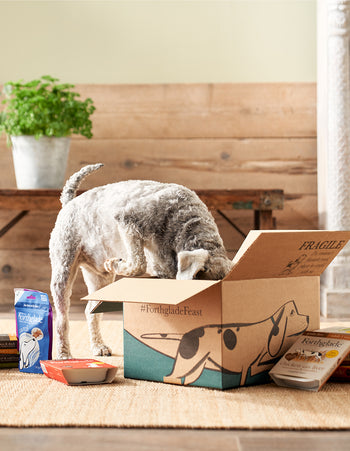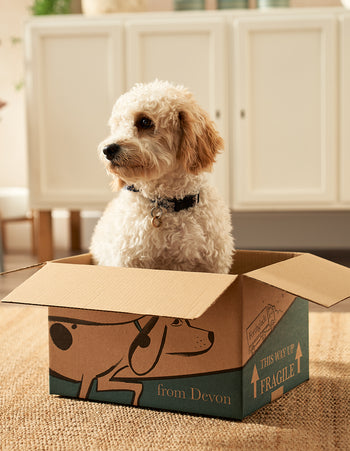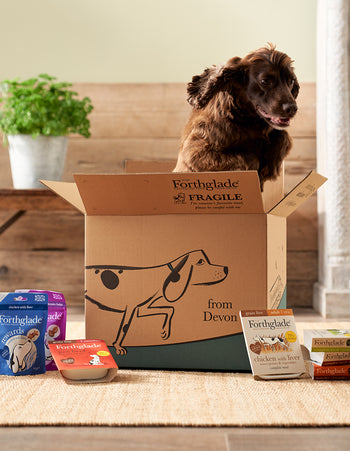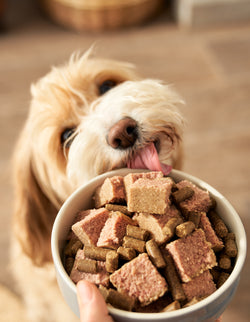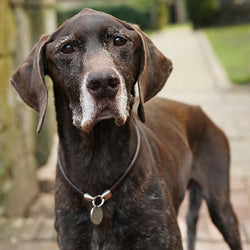If you’ve not camped with your dog before, the spring and summer is certainly the time to give it a try. Camping is far cheaper than a hotel or cottage so it’s a great choice for a lower-budget option for a night or two away. It’s also a great opportunity to spend quality time together, away from daily life and technology.
Plus, there’s warm weather, exciting outdoorsy smells and coastal or countryside walks on tap – what’s not to like?! Or if you’re a seasoned camper, a winter-camping experience with your dog could tick all the boxes: fewer people, cold, crisp walks and snuggles in the tent.
Whatever time of year you head off, you may be concerned about keeping your pup safe when sleeping in the great outdoors. Another worry could be whether they’ll keep the whole campsite up all night! Some careful prep in advance can help you all enjoy your trip into the wild.

Before you go: prepare your dog for sleeping in a tent
A major concern when away from home might be how well your dog will sleep overnight. Will they settle or will they crawl all over you or bark at every noise outside?
- Trial sleeping in your tent at home to get your dog used to the enclosed new environment – and the novelty of sleeping on the ground next to you.
- Bring their bed, crate or favourite toy to ensure they have something that smells familiar to relax with, and place them close to you. This roll-up dog mat is super-comfy and a real space saver.
- Pack plenty of blankets to layer up on your dog if required. Even during warm summer days, temperatures can drop overnight.
- Bring a portable white noise machine (often used to help babies sleep) can be a great idea if your dog tends to be an alert barker. It creates a little buffer between the sound in your tent and those outside noises. Start using this at home before you set off to help your dog get used to it.
Campsite essentials: how do I keep my dog safe while camping?
Ensure your tent has a zip closure
Tents don’t offer the same security as walls and a closed-off garden, so keeping your dog safe is at the top of the list when sleeping under the stars. Ensure that it has a zip as the main closure, as velcro door seals can be pushed apart by inquisitive noses!
Provide a crate to keep your dog safe and secure overnight
If your dog is used to sleeping in a crate at home, this is a great option. Not only will it allow them to feel comfortable overnight, but it gives you a safe space to secure them (perhaps with a lovely Forthglade food-stuffed Kong to entertain them!) while you’re putting up the tent on arrival.
This travel crate is lightweight, easy to set up and has a clip to secure the door zip to stop the escape of even the most cunning pets.
Check the campsite’s rules for pets before you arrive
Familiarise yourself with the no-go and off-leash areas. Stay away from wildlife and remember to bring lots of poo bags so you can pick up after your pup.
Pack a long training lead to use on-site

A long lead is a must when camping. It allows your dog a little bit of freedom, while they’re either attached to you, or a securely fastened stake in the ground. The chances are there will be lots of different smells (and maybe the odd squirrel or deer) that could encourage your dog to wander off, so keep that longline attached at all times.
Never leave your dog unattended when camping
Don’t close them in the tent on their own. Even if your dog feels relaxed when home alone, there’s a high chance they won’t enjoy it in a new space. Also, tents don’t have climate control – if the weather changes, your dog could overheat, or get cold or wet.
Prevent your dog from getting lost
Attach an LED light to their collar so you can easily see them when you’re toasting marshmallows around your campfire at night. Or, get them a GPS tracking dog collar, so you can seek them out if they do happen to wander off.
Prepare for the (unpredictable) weather
Be prepared for whatever mother nature throws your way. If it's going to be warm, bring plenty of water and provide a shady spot for your dog to relax. If it's going to be cold, give them a warm place to snuggle. Always pack extra blankets, as temperatures can drop at night.
Don’t forget your dog’s first aid kit
You never know what’s around the corner, so make sure you pack your dog’s first aid kit in case of any accidents. Pack it in a zipped case or container, put it somewhere easily accessible and don’t forget it when you go out on a long walk. Don't forget these essentials:
- Vaccination and medical records, and emergency phone numbers. If you need to go to an emergency vet, they’ll be better equipped to help if they know your pup’s medical background. Make a hard copy of any phone numbers in case you lose your mobile.
- Antibiotic ointment. Pack an antibiotic salve to treat any minor cuts and grazes, prevent infection and relieve pain. Ideal to keep the wolf from the door before you can take them to the vet’s when you get home.
On arrival: familiarise your dog with camping
When you arrive, allow your dog a calm stretch of their legs and toileting opportunity before you start trying to work your way through erecting the tent. Prep stuffed food toys or natural long-lasting treats to keep your dog occupied: try these Forthglade calming treats with camomile.
In warm weather, avoid leaving them in the car as it can quickly heat up, risking serious health conditions such as heat stroke. Where possible, if travelling in a group, have a dedicated dog carer who’s in charge of keeping your pup entertained and relaxed while setting up.
Try to arrive earlier in the day, so your dog has some time to familiarise themselves with the environment before it’s time for bed. It also allows you time to ensure they’ve been walked and had some calming mental activity so they’re more tired overnight.

Fuelling for adventure: what do I feed my dog while camping?
One of the most important items on the packing list for camping with your dog should be their regular food. If their standard meals are forgotten and an alternative food is required, an upset tummy is likely to occur, which could be disastrous when camping!
A natural and nutritious breakfast will set up a dog for a day exploring, while a healthy dinner will help them settle into a good night’s rest. Wet or dry food is equally good for adventures away from home. Forthglade’s natural wet meals are easily stored and simple to serve from the convenient trays as they also don’t need refrigeration until opened.
The natural dry cold pressed recipes are also easy to store, transport and serve.
When away from home, it’s important to help dogs feel at ease when eating, so stick with their usual routine. Pack their food bowl, keep feeding times the same and provide lots of fresh drinking water. Don’t forget to pack plenty of tasty treats, to encourage and reward good behaviour and use within a few fun games, too. 
Create balance: how to keep your dog calm while camping
While camping can provide you with some wonderful time together and plenty of outdoor adventures, if your dog is normally used to a more relaxed pace of life, they may find it a bit much.
Snooze Time
Try to create some balance during your trip away, so not every day is filled to the brim with hiking, playing and barbecues. Plan in some quiet time for the humans to relax with a good book and your dog to have a quality snooze!
Visual Barriers
If you’re staying in a crowded campsite, it can be overwhelming even for the most social of dogs. Consider some sort of visual barrier to put up around your pitch, so that your pup doesn’t have to see the comings and goings of everyone around them.
A Safe Place To Relax
Create a safe space for your four-legged friend for when they need a break from all the excitement. Bring their crate with their bed from home to help give them a sense of familiarity and a place of refuge when there's too much going on around them.
Hang Out Together
Most importantly, this is a time to enjoy togetherness. Try to switch off and unplug from technology. Our dogs are great reminders to spend more time really living in the moment – and what better way to do that while away on adventures together. 
What to pack: happy canine camper essentials
- Collar and lead (plus name tag with mobile number)
- Leads – both short and long leads are useful
- Water for the trip, portable bowl (and water bottle for when you’re out)
- Your dog’s regular food and bowl
- Healthy dog treats
- Spare towels for muddy paws
- Poo bags
- Stake and long line
- Dog bed/camping pad and blankets
- Dog first aid kit
- Travel crate or harness for the journey (and potentially tent)
- Dog toys to keep them entertained and help them settle
- Canine buoyancy aid if getting in water
- Tick remover (checking daily for ticks when away)
- Reflective wear, either on a collar, a lead or a jacket, is useful when dark
- A hose-down shower to wash off mud and sand.
Keep your eyes peeled for more fun-packed adventures, inspiring stories and top tips from leading experts. So, lace up those hiking boots, pack the tent, pump up the paddleboard and head off on an adventure with your four-legged friend. Find out more here.






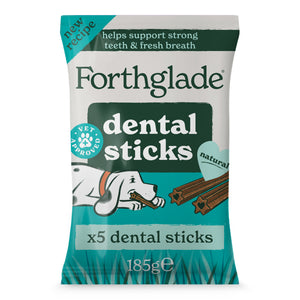
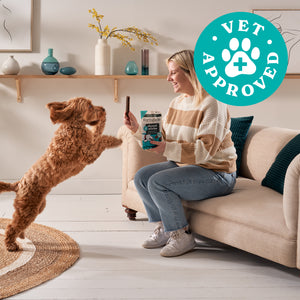
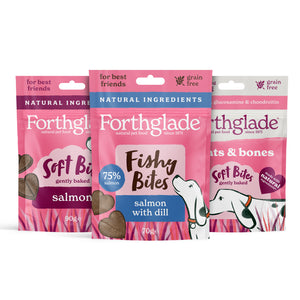
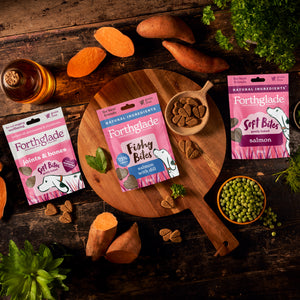


 FAST & FREE DELIVERY ON ORDERS £40+*
FAST & FREE DELIVERY ON ORDERS £40+*
 SUBSCRIBE TO SAVE 10% OFF EVERY ORDER
SUBSCRIBE TO SAVE 10% OFF EVERY ORDER
 OVER 13,600 5 STAR REVIEWS
OVER 13,600 5 STAR REVIEWS


